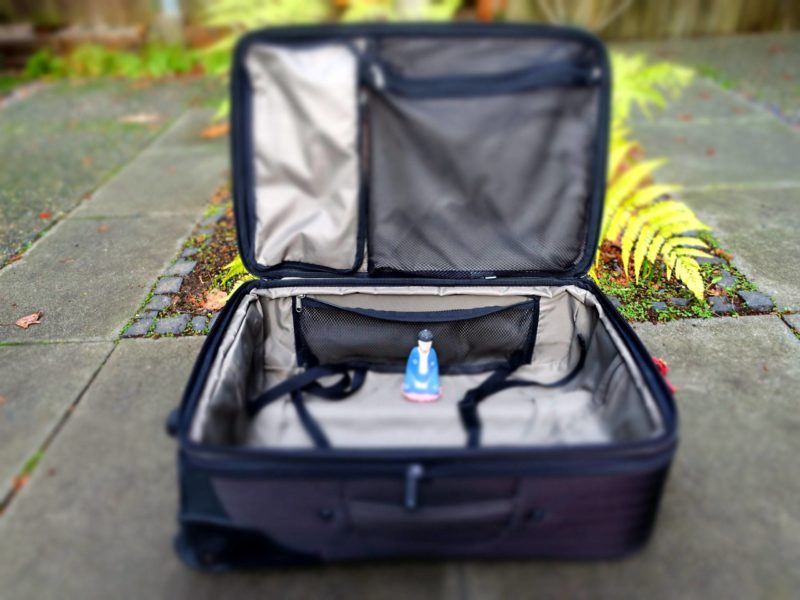Emotional baggage, or just “baggage,” is an expression used to describe the emotional issues that preoccupy our minds and bodies. Whether in your fitness life, family life, or professional life, being preoccupied with your emotional baggage is a hindrance at best.
The metaphorical idea of emotional baggage is that it’s a suitcase full of past disappointments, wrongs, and traumas that we carry around with us. Importantly, our emotional baggage is the filter through which we perceive and experience reality.
We come in to this life with baggage. We have inborn natural neurobiological tendencies in the ways we perceive and respond to reality. Some of those natural tendencies promote healthy relationships with others and ourselves. Other tendencies aggravate and destabilize our relationships with others and ourselves. These negative tendencies our part of our baggage, and often get called “bad” karma. (And, of course, there are other natural tendencies that are “neutral”–they don’t seem to have good or bad effects on our lives.)
As we grow up and go through our lives, we respond to our various life experiences, challenges, and traumas through the lens of our natural neurobiological tendencies. Regardless of the details of a particular situation, we respond and react using our inborn tendencies as our interpersonal “toolkit.” The problem is, our inborn toolkits and tendencies are often insufficient for any particular situation. This often results in interpersonal frictions, dramas, or worse.

A couple interesting things about baggage:
–We tend to think everyone else has baggage, but “not me.” It’s easy to see others’ shortcomings, but seemingly impossible to see our own.
–It’s hard to get rid of our baggage. Since we tend to think of baggage as being in a metaphorical suitcase, we tend to think it’s something we can accidentally forget or lose, like losing or forgetting luggage at an airport. The fact is no matter how enlightened we think we might be, we all have baggage and it’s with us every moment.
One way to think about baggage is that it is a manifestation of karma:
Now as a man is like this or like that,
according as he acts and according as he behaves, so will he be;
a man of good acts will become good, a man of bad acts, bad;
he becomes pure by pure deeds, bad by bad deeds;And here they say that a person consists of desires,
and as is his desire, so is his will;
and as is his will, so is his deed;
and whatever deed he does, that he will reap.
Our baggage, like karma, is psychological inertia, comparable to Newton’s First Law:
An object in motion remains in motion unless acted on by a force.
It is our natural tendency to repeat the same harmful/destructive/toxic thoughts and behaviors over and over, regardless of the outcomes.
How can we apply a “force” to slow down or stop the incessant “motion” of unhealthy tendencies?
For most of us, the “go to” solution for addressing our emotional baggage is psychotherapy or counseling. Case in point: I went to counselors and therapists during most of my 30s. At first, it was to help me deal with the childhood trauma of growing up in an alcoholic family. That transitioned to dealing with trauma and PTSD from a near-fatal auto accident. While I do think I got some benefit in identifying and clarifying those traumatic experiences, I never really felt like counseling enabled me to resolve my underlying problems. The counseling may have even been a bit detrimental in that it promoted my tendency to overthink.
Meanwhile, I’ve practiced Vipassana “mindfulness” meditation since 1989. Vipassana is a technique in which you learn to develop a calm, concentrated mind. Then you apply that calm, concentrated state of mind to observe the reality within the framework of your mind and body. The variation of Vipassana that I practice focuses on observing physical sensations whatever they are: strong, or subtle, pleasant or unpleasant. One of the main features of Vipassana is that by merely observing the sensations in your mind and body, you are observing your baggage. In turn, this has the therapeutic effect, little by little, of gradually eradicating your baggage. I have a strong belief that Vipassana helped reduce the PTSD I experienced after the auto accident: My therapist and doctors expected it to persist for at least five years, and possibly last my entire life. Instead, the PTSD symptoms were virtually gone after less than six months.
The act of calmly, attentively, observing sensations with a concentrated mind is an act of owning and opening up your baggage. Owning and opening up your baggage eradicates it, little by little.
As you get more adept at objectively observing your feelings, your self-awareness gradually gets better and better. Over time, with dedicated practice, you notice that you tend to reflexively react, out of control, in particular situations. With greater self-awareness you notice those moments more often, and you gain the ability to slow down or eliminate that knee-jerk reaction process. The result is less drama and more harmony in your life.
“The very purpose of spirituality is self-discipline. Rather than criticizing others, we should evaluate and criticize ourselves. Ask yourself: ‘what am I doing about my anger, my attachment, my pride, my jealousy?‘ These are the things we should check in our day to day lives.”
–Dalai Lama
With greater self-awareness, the capacity for empathy increases. As you spend more time examining your feelings, you realize that you share trauma, pain, and suffering with every other human. In turn, as you realize you are connected to every other human through suffering, the capacity for compassion increases.
Compassion enhances our self-confidence because a calm mind allows our marvellous human intelligence to bloom. When we’re angry, our thinking is distorted and we don’t see the different aspects of reality. A calm mind enables us to take a broader, more realistic view.
— Dalai Lama (@DalaiLama) January 14, 2020
Whether in your fitness life, family life, or professional life, the pathway to eradicating your emotional baggage involves claiming and opening up your baggage. Vipassana “mindfulness” meditation is a powerful tool that just might work for you.
Disclaimers:
1. Is it possible to completely eliminate all of your baggage? I don’t think so. It’s like peeling an onion: you remove one layer only to see there is another, deeper layer. But, by persistently working on it, over time, you’ll gradually have a better life and better relations.
2. If the idea of Vipassana meditation appeals to you, realize is not for everyone. As I’ve noted before, in pop psychology circles it gets touted as a cure-all for everyone. But it’s not. Not everyone is suited to do the rigors of the practice. It takes a 10-day retreat to adequately learn the practice. It’s hard: Getting long-term benefit outside a meditation retreat requires intentional effort toward changing your lifestyle and habit patterns.
